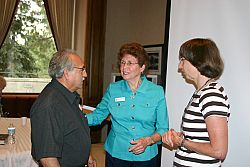Religious Education directors learn methods to form spirituality

SALT LAKE CITY — Religious education directors received tools to aid them in forming students’ spirituality at the annual meeting held at the Bishop’s Residence July 27.
The presentation was given in two sessions, one in English and the other in Spanish, by Dominican Sister Rosa Monique Peña, past director of religious education for the Archdiocese of Miami, Fla. Her background also includes developing a bilingual catechist certification program and teaching at St. Vincent de Paul Regional Seminary in Boynton Beach, Fla., and the Archdiocesan Diaconate Program.
"My hope is that the DREs become aware of the importance of the spirituality of the children and that they find numerous ways of addressing the different stages of their spirituality," said Sr. Rosa Monique. "Today the children may have a reservoir of prayers, experiences and activities that will carry them through life. What we find with people who have not had any spirituality in their childhood and face a crisis is that they find themselves empty and in desperation, or they discover religion and become fundamentalists of the faith. Spirituality begins with parents teaching their children at home."
Sr. Rosa Monique said her own image of God changed over the years from a God she feared but was delighted to try to please, to a just God in her college years, to a God in her adult years who is increasingly challenging, she said.
After growing up in the Dominican Republic, she fled with her family to Chili in her college years because of war. It was then she became aware of the inequalities of humanity, she said, and she went searching for God to the place she was comfortable praying the rosary processing through the streets, where she could smell the aroma of coffee from shops and the incense in church and could feel the love of God again, she said.
"Whatever is sown will come reaping in the end," she said. "It is important for catechists to get to know their students and for DREs to get to know all of the students and see each one as an individual."
For the DREs, she outlined different stages of spirituality.
The first stage is Wonder and Awe, a time of fascination when children want to believe.
"At this stage the influence of the catechist can permanently influence the life of a child so mood and attitude are extremely important," Sr. Rosa Monique said. "This is a time when students also need Bible stories in addition to lessons, and to hear that God is there for them and will help them in a crisis."
The second stage is Literal Faith: Students start to question, to reason and want to know the rules. Talking to students who are in this stage about prayer, life’s difficulties and letting them spend 10 minutes in silence in church teaches them contemplation and silent prayer, Sr. Rosa Monique said.
During the third stage, the Poverty level, students focus on life’s difficulties, and "the influence of the catechists is important; put faith, hope and love into the lessons and reflect on Jesus and the issues of humanity," Sr. Rosa Monique said.
Catechists can talk doctrine to the students until they are blue in the face and students will still be yawning; it’s more effective to use experiences and put students into the situations, Sr. Rosa Monique said.
Lisa Bachiller, an adult education teacher at Saint Thomas More Parish, believes starting catechesis with adults enhances family life.
"Adults forget how much they know and understand," said Bachiller. "When we tap into their knowledge, the Mass comes alive and they come alive and that is transferred to their children."
© Copyright 2024 The Diocese of Salt Lake City. All rights reserved.

Stay Connected With Us